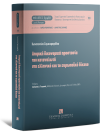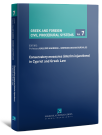F. Ferrand/L. Mayer/D. Tsikrikas..., Cassation in French and Greek Civil Procedural Law, 2022

Comparison among different procedural systems prevents the isolation of legal orders and leads to the improvement of institutions. Cassation in French and Greek civil procedural law is in the center of this sixth volume.
A comparative approach to the conditions of recourse and administration of justice in the highest civil courts of two European countries, which, although belonging to the family of so-called continental law, and in particular the civil code, do not have the same procedural and judicial traditions, is undoubtedly a challenging task.
In the following essays, the reader will find useful analyses of Greek and French procedural law in English, a language neutral to the communication between the jurists of the two jurisdictions, which is in itself a challenging exercise. For, both in the practice of the Greek Areios Pagos and, especially, of the French Cour de cassation, linguistic patterns are very important not only for the functioning of these jurisdictions, but also for the law itself.
Edition info
Table of contents +-
Table of Contents
VSeries Editors’ Foreword
VIIIntroductory remarks (by. Prof. Panayiotis Glavinis)
1The distinction between facts and law on cassation - The evolution of the control exercised by the French Court of cassation (by Prof. Dr. Frédérique Ferrand)
1I. Introduction
11. Brief historical reminder
32. Aims of the cassation
9II. The classical distinction between facts and law
1.
10The implementation of the distinction between facts and law by the Court of cassation
12a) Legal norms under review
17b) Fact finding and assessment
c)
18The stage of the legal characterisation of the facts (qualification juridique des faits)
232. Cassation grounds (cas d’ouverture à cassation)
343. The request for advisory opinion (saisine pour avis)
35a) Requirements to be fulfilled
b)
37The advisory opinion is not binding on the lower court that requested it
41c) Statistical data relating to the request for advisory opinion
III.
42The evolution of the control exercised by the French Court of cassation: the new scrutiny in concreto of the conformity with the European Convention on Human Rights
IV.
49The broadening of the possibility of quashing a judgment without remitting the case to a lower court (cassation sans renvoi)
57V. Conclusion
63The aim of cassation and the conditions of filing a cassation (decisions subject to cassation, parties, time period) under French Law (by Prof. Dr. Lucie Mayer)
I.
69A consensus on the definition of the missions of the Court of cassation
A.
70The mission pursued by cassation of decisions in breach of a legal rule: to ensure compliance with the law
B.
71The missions pursued by means of the interpretation of the legal rule applicable to the dispute: to ensure the unity and evolution of the law
1.
72The content of missions linked to the interpretation of the law by the Court of cassation
742. A specific appeal: appeal in the interest of the law
II.
76The contemporary debate on the importance of its respective missions and, more essentially, on the nature of the power of the Court of cassation
76A. Should the mission to review legality be reduced?
B.
81Does the Court of cassation have the power to create norms?
1.
82The “realist” approach: the Court of cassation has the power to create norms
2.
85The “formalistic” approach: the Court of cassation has no normative power, but its decisions have normative significance
III.
87The practical implications of the debate: the system of cassation and the changes considered or effected
90A. The degree of openness of access to the Court of cassation
901. The admissibility of the initial appeal for cassation
90a. In substantive law: widely accepted admissibility
b.
92In prospective law: the plan, currently abandoned, to implement selection of appeals for cassation
2.
96The admissibility of the appeal against an appeal after cassation in line with the cassation
98B. Other practical implications
981. The modulation over time of reversals in case law
1002. The requirement to give reasons for a decision
1013. The amicus curiae
103The aim of cassation and the conditions of filing a cassation (decisions subject to cassation, parties, time period) under Greek Law (by Prof. Dr. Dimitrios Tsikrikas)
I.
103The Greek model of cassation in the European comparison – the historical perspective
1031. The historical evolution of cassation in the European law
1031.1. The Roman law
1.2.
104The French and German law before the French revolution
1.3.
105The cassation after the French revolution and Napoleon’s codification
2.
107The cassation in the Greek procedural law under historical and comparative perspective
II.
108The aim of cassation in the contemporary Greek procedural law
III.
109The cassation as a review appeal for the protection of legal norms and for the uniformity of courts decisions
1.
109The grounds for cassation – especially by violation of European procedural law and conflict of law rules
1112. The proceeding of cassation
1123. Cassation in the interest of the law
IV.
113The function of cassation for the effective judicial protection of legal interests of the parties
1.
113The dominant position of the parties in the proceeding of cassation
1142. The violation of foreign substantive and procedural law
3.
114The possibility of Areios Pagos to suspend the enforceability of the attacked decision
4.
115The “inter partes” binding effect of the decision over cassation – The proceeding upon reversal of the attacked decision
116V. Decisions which can be subject to a cassation
117VI. Filing of cassation
VII.
117Legitimation and time period to file a cassation – cassation in the interest of the law.
119VIII. Concluding remarks
121The distinction between facts and law on cassation – The evolution of the control exercised by the Court of Cassation under Greek law (by Assoc. Prof. Dr. Ioannis Delikostopoulos)
121I. The creation of a system of law
123II. The distinction between questions of fact and questions of law
III.
141Specification of vague legal concepts and cassation review of the extreme limits of legal concepts of dual hypostasis through the principle of proportionality. The evolution of the control exercised by the Court of Cassation
161IV. Conclusions
165Proceeding of cassation under Greek Law (by Assist. Prof. Dr. Anna Plevri)
I.
165Basic characteristics of cassation as a method of review of judicial decisions
168II. Initiation of proceeding of cassation
172III. Representation of parties before the Supreme Court
173IV. Proceeding of cassation
180V. Epilogue
183Grounds for cassation examined ex officio under Greek Law (by Dr. Anastasia Vezyrtzi)
183I. Introduction
II.
183The ability of the Court to invoke cassation grounds or raise arguments sua sponte from a comparative perspective
III.
186Grounds for cassation raised ex officio under Greek Law: The recent amendment of Article 562 §4 CCP
IV.
188Ex officio power v. procedural safeguards for the parties right to a fair trial: Concluding Remarks
191A comparison between French and Greek cassation proceedings. Concluding remarks (by Professors Dr. Kalliopi Makridou and Dr. Georgios Diamantopoulos)





















